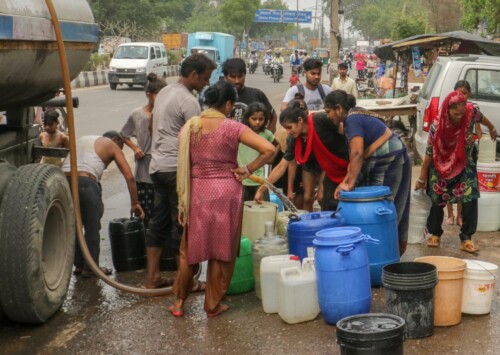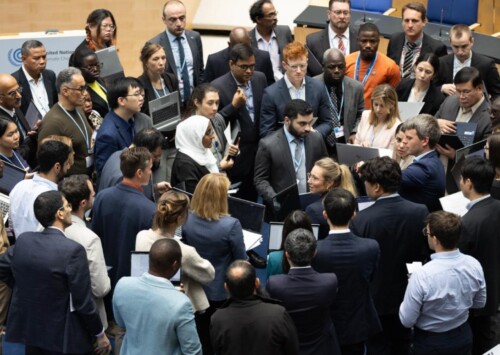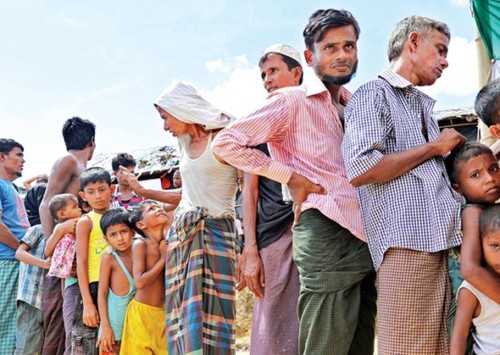3.3 billion people paying price of inaction over climate change, warns Rockefeller Foundation

World leaders at the G7 Summit reaffirmed their support for the COP28 Declaration on Climate and Health (Photo: UN Photo/Sebastian Rich)
On Saturday, as leaders of almost two dozen nations and global institutions headed back home after three days of deliberations as part of the G7 Summit in the Italian resort town of Fasano on the coast of Adriatic Sea, they had little to show for their discussions.
Unlike most other topics at hand for the leaders gathered in Fasano, climate change was the one which impacts every single nation in the world in a terrible manner and which is not a zero sum game, as other issues notably the Russia-Ukraine war may be construed by some.
For well over a decade, leaders from around the world, notably the rich nations, have been pledging action to cut their carbon emissions rapidly and also to cough up the hundreds of billions of dollars that are needed by the developing and vulnerable countries to deal with climate.
But yet the declaration by the world’s seven richest nations that comprise G7 only goes on to repeat the need to take action and generate funds, but without any specifics as to which nation will contribute how much and by when.
Experts warn that this prolonged inaction comes with a heavy price and which will be paid not by the seven leaders, but by over 3.3 billion people around the world whose health and well-being is being severely impacted by this inaction.
“The impacts of climate change on global health are profound and far-reaching, from the spread of infectious diseases to the exacerbation of chronic health conditions. Rising temperatures and extreme weather events are directly affecting the health and well-being of communities worldwide. As our planet comes closer to 1.5 degrees Celsius of global warming, world leaders must take decisive action to protect our people and our planet,’’ Dr Naveen Rao, Senior Vice President (Health) of Rockefeller Foundation, tells Media India Group.
Rao says that it was encouraging that world leaders, at the G7 Summit, reaffirmed their support for the COP28 Declaration on Climate and Health. “But we need to go beyond pledges and commitments to mobilise tangible financial resources for countries to implement needed climate-health solutions. An estimated 3.3 billion people are paying the price of this inaction with their health, with the most vulnerable, the people least responsible for the crisis, suffering the most,” he adds.
“As the world gears up for the UN General Assembly, G20, and COP29, the Rockefeller Foundation is calling on world leaders to take swift action to cut emissions, boost climate finance, and invest in future-proof solutions that protect our health,’’ says Rao.
Unfortunately, the G7 Summit was just one of the three chances that the world leaders have had in the past two weeks to take concerted action to cough up the money for dealing with climate change.
Last week also saw the latest round of discussions under the aegis of the United Nations Framework Convention on Climate Change that took place at its headquarter in Bonn, Germany. But like every other climate change meet, this round of negotiations also proved to be a catastrophic failure, with absolutely no progress reported after the week-long discussions.
The Bonn meeting was preceded by the the 77th World Health Assembly that convened in Geneva from May 27 to June 1. With a focus on pressing issues like climate change, pandemic preparedness and health equity, the assembly represented yet another occasion for countries to make marked significant strides on climate change and future of public health.
The World Health assembly brought together decision-makers from 194 member states, partner agencies, representatives of civil society, and WHO experts. This annual meeting of the World Health Organisation (WHO) served as a platform for addressing a wide range of health-related issues, including maternal and reproductive health, universal health coverage, mental health and antimicrobial resistance. The theme for this session was “All for Health, Health for All.”
According to Naveen Rao, a significant achievement of the assembly was the unanimous approval of the General Programme of Work 14 (GPW 14), which outlines WHO’s work plan for the next three years.
“This approval marked a significant milestone, especially for those advocating for the integration of climate change into health strategies. GPW 14’s emphasis on climate change and health, now identified as a top priority, reflects a growing recognition of the intertwined nature of environmental and health challenges. The inclusion of a measurement framework to capture the health impacts of climate change is a crucial step forward,’’ he says.
He warns that as global temperatures rise and extreme weather events become more frequent, the once-distant threat of climate change has now become an urgent reality. Communities around the world are grappling with the immediate consequences of a warming planet, from more intense storms to prolonged droughts. However, beyond these visible impacts lies a deeper connection to health and well-being.
“Climate change is no longer a distant concern. It is becoming an integral part of our daily lives. Beyond its direct impact on healthcare and disease, people are recognising its role as a force multiplier for social determinants. Climate change affects essentials like clean water, healthcare accessibility, and overall health quality. It is not just about climate, it is about health. They are inseparable now,” says Rao.
He adds that the urgency of addressing climate change’s impact on public health took centre stage at World Health Assembly. Discussions delved into the intricate nexus between environmental degradation and human well-being. Amidst these dialogues, one notable revelation emerged that while approximately 40 countries face imminent threats from climate change-induced disasters, India and Bangladesh, despite their vulnerabilities, are not included in this list.
“While approximately 40 countries are deemed most vulnerable to climate threats like cyclones and droughts, it is noteworthy that India and Bangladesh aren’t among them. Despite their challenges, they are not on the endangered list. However, they too face significant hardships and are crucial players in climate action,” he adds.










